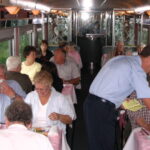When Something Goes Wrong . . .
Things can and do go wrong when we travel. And if it happens while we’re out of the country, the problems become instantly worse and the unpleasant, expensive and inconvenient consequences are increased by . . . well, by a lot, depending on where it happens.
OK, for what it’s worth, here’s what I do and don’t do, especially when I’m traveling out of the country.
1. Establish a routine and stick to it. That’s more important than anything else. If your passport is in your back pack on Monday, but you carry it stuffed in your hip pocket on Tuesday, then leave it on the coffee table in your hotel room the next day, it can go missing for a couple of days before you realize it’s gone.
By the way, it’s a really good idea to make a color copy of the page in your passport with your photo and have that with you . . . tucked away in a safe place . . . just in case.
2. Don’t rush. Airport security is where you really feel pressed. People behind you are in a hurry and you’re aware of that which causes you to pick up the pace. And that’s when mistakes happen! So stop, take a breath, and take 30 seconds to step to the side and re-group.
3. Leaving the hotel room. Here again, take 30 seconds after you’re all packed, to give everything one final check before you leave your hotel room to check out.
I had a roommate in college who recited a little checklist under his breath whenever he left the fraternity house. I still remember it: “Wallet-keys-comb-cigarettes-fire.” Good idea!
4. Medications are obviously very important and losing them is something I do worry about when I travel. My solution is to keep all my pills in the same place all the time: in my small shoulder bag.
I will never put my medications in a bag I’m going to check when I fly. It would be very hard to quickly replace pills that were in a bag the airline mistakenly sent to San Francisco while they were taking me to San Antonio.
5. Do not overpack! I think it was Rick Steves who said, “There are only two kinds of travelers: those who are traveling light and those who wish they were.” Yep, he nailed it!
6. Will you need paperwork? On a European trip, check to see if any of the countries you’ll be visiting require a visa. Remember it’s a bureaucratic process and can take time. And if you’re traveling by train, be especially alert for countries that require a transit visa. These are the people who are going to make you pay for the privilege of just passing through their country! Chances are, they are not going to be friendly, so be sure to get a transit visa . . . and smile!



